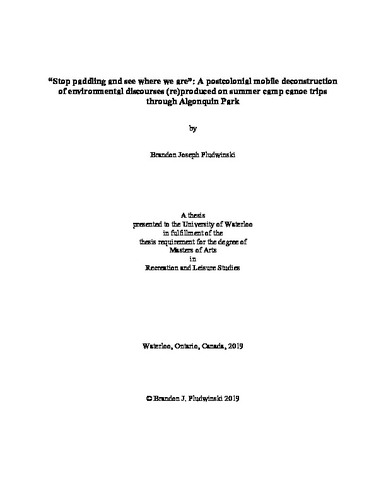| dc.description.abstract | Residential summer camp canoe trippers are important. They are agents of socialization who amalgamate their campers into socially constructed accepted regimes of truth (Csikszentmihalyi, 1981; Grimwood, Gordon & Stevens, 2017). In other words, the trippers operate within a field of power to provide their campers with the lens they use to make sense of the world around them, adhering to certain truths and expelling others (Warren, 2002). While scholars have approached the field of outdoor recreation within a critical lens (Culp, 1998; Johnson & Ali, 2017; Whittington, 2018), this research shifts focus onto the residential summer camp canoe trip through Algonquin Park. The purpose of this postcolonial mobile qualitative research is to analyze the environmental discourses summer camp canoe trippers operate within while leading campers on canoe trips through Algonquin Park. Using a postcolonial framework, this research aims to deconstruct how environmental discourses are commonly, both consciously and unconsciously, enacted by residential summer camp trippers and embedded within broader and recurrent social discourses that have been normalized in a religious residential summer camp in Haliburton, Ontario. The qualitative data, collected through semi-structured interviews, participant observations, and a reflexive journaling activity proposed by Mullins (2013), reveals how participants localize environmental discourses, (re)producing their meanings and legacies along the way. This thesis illustrates how negative colonial legacies of land dispossession, the erasure of Indigenous peoples, particular traditional masculinities, and cultural appropriation have uncritically been employed by summer camp trippers to further benefit and ease their own practice of canoe tripping. Together, the data and analysis provide context to suggest alterations to the summer camp canoe tripping program, reconciling tensions between the tripper’s role as beneficiaries of settler colonialism and the privilege they hold to take campers through Algonquin Park. | en |

